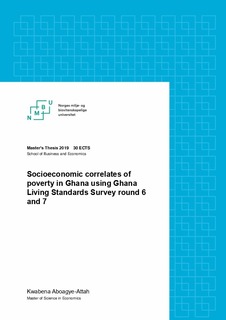| dc.description.abstract | Poverty is a measure of standard of living in a country. This thesis studies the social and economic factors correlated with poverty in Ghana. Data from the sixth and seventh rounds of the Ghana Living Standard Survey (2012/13 & 2016/17) were used to examine the correlates of household poverty. Binomial probit regression were used to analyse selected socioeconomic variables and their degree of correlation with poverty status. Results from the study indicated that education, literacy, locality and household size are strongly correlated with poverty. Education, savannah zone, locality, sex of household heads and literacy are significant variables. Poverty is more pronounced in rural areas than in urban areas. Households in savannah zones are the poorest compared to those in coastal and forest ecological zones. The results also showed that there is a high probability for male headed households to be poorer than female headed households. This is because most poverty interventions by international organisations and non-governmental organisations mostly focus on females in rural areas with little attention being paid to males. Also, household heads that never attended school are more likely to be non poor than household heads who attended school. This could be attributed to the freeze on public sector employment by the International Monetary Fund (IMF) as a loan conditionality from 2015 to 2019. Because the public sector employs a high percentage of the labour force of which majority are males, they are likely to be affected most.
Since education is closely correlated to poverty from the findings, it was recommended that existing educational policies should be enforced to ensure universal basic education for all. Also, structural development and infrastructure should be expanded to the rural areas. Agricultural and regional-specific policies and directives should also be undertaken to help alleviate household poverty. | nb_NO |

